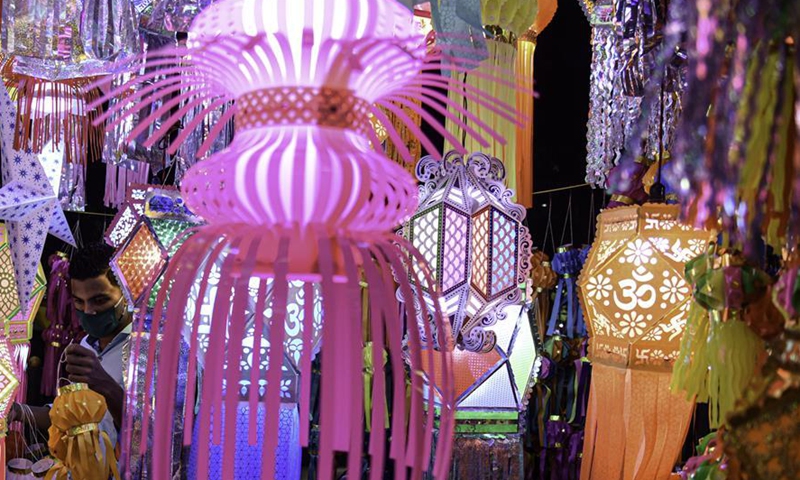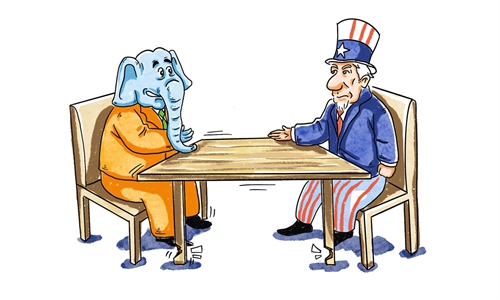China-India trade could reach $100b for first time in 2021, Indian envoy says despite hurdles

A vendor arranges lanterns at a market before Diwali, the Hindu festival of lights, in Mumbai, India, Nov. 9, 2020. Hindus across India buy lanterns and candles to decorate their homes during Diwali, which falls on Nov. 14 this year. (Photo by Fariha Farooqui/Xinhua)
Bilateral trade between China and India is expected to exceed $100 billion in 2021 for the first time, given the market potential and complementarity between the two countries on trade, Indian Ambassador to China Vikram Misri told the Global Times in an interview on Tuesday, despite hurdles and uncertainty.
Speaking to the Global Times on the sidelines of the 1st BFA Global Economic Development and Security Forum in Changsha, Central China's Hunan Province, the Indian ambassador expressed optimism about bilateral trade ties, citing huge potential for cooperation in areas such as pharmaceuticals.
However, Chinese experts said that tensions in bilateral relations over India's moves on the border issue and the country's increasing restrictions on Chinese businesses pose hurdles for trade cooperation.
Misri said that even though there was a slight dip in bilateral trade last year because of the COVID-19 pandemic, it was not as big as people expected, and this year's trade "will definitely be an increase over last year."
From January to September, China-India bilateral trade reached $90.37 billion, up 49.3 percent year-on-year, according to data released by China's General Administration of Customs on October 13. China's exports to India reached $68.46 billion, up 51.7 percent.
In recent years, China has been one of India's largest partners in merchandise and goods trade, which has consistently stood in the $90-95 billion range.
Bilateral trade includes a very broad category of items, ranging from electronic equipment to textiles, plastic, iron and steel, and much-needed pandemic preventative items such as masks and ventilators, indicating the highly complementary nature of trade between the two counties.
Products such as pharmaceuticals have huge potential that has yet to be realized, according to the ambassador.
China's annual imports of generic medicines total about tens of billions of dollars, out of that, only around $20 million comes from India, which is a very small proportion, the ambassador said, expressing hope for easier access for Indian companies to the Chinese market so that more Indian drugs can take advantage of these conditions.
India is still highly reliant on China in terms of trade, especially in some export industries that are major foreign exchange earners like pharmaceuticals and textiles, even though the Indian government has imposed many sanctions against Chinese companies and products, Liu Zongyi, secretary-general of the Research Center for China-South Asia Cooperation at the Shanghai Institutes for International Studies, told the Global Times on Tuesday.
At least 70 percent of India's active pharmaceutical ingredients are imported from China, as well as around 80 percent of its raw silk, while 95 percent of India's solar power components also come from China, the expert said.
Other areas such as electronic devices like mobile phones from China are also gaining significant market share, despite Indian authorities' restrictions on Chinese firms.
"The surge in bilateral trade also reflects India's increasing reliance on China after the pandemic, which led to the suspension of production in domestic factories. China has been the pillar of foreign trade after successfully reining in the epidemic and resuming production," Liu said.
While there have been rising expectations for trade and cooperation between the two neighboring countries, experts said that bilateral economic and trade relations have not seen the expected breakthroughs because of tensions in bilateral ties over the border issue.
"The discussions are going on and we hope that both sides can resolve this [border] issue, because it is casting a shadow on bilateral relations," Misri said.
The ambassador added that both India and China are two large countries in the world and have historical records of engagement and cooperation, which "have been largely positive for the last 30 years."
While there is a high possibility that bilateral trade will exceed $100 billion, Liu said that this figure could become the peak, since the outlook for bilateral economic and trade relations is not too optimistic. He urged India to change its hostile policies toward China, especially on the border issue, to avoid negative impact on bilateral relations.


